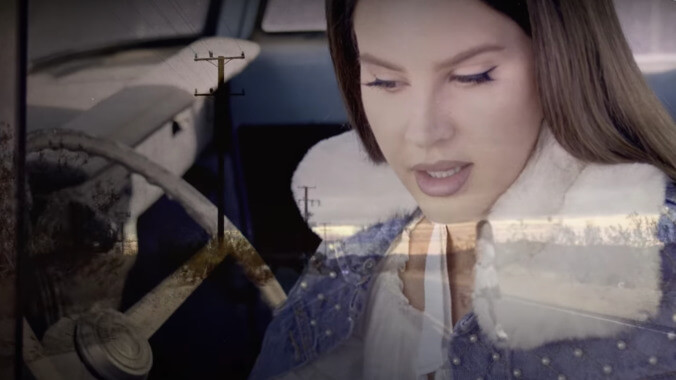Lana Del Rey’s Chemtrails Over The Country Club lives in NFR!’s superior shadow

Let’s address the elephant in the review: No matter what album Lana Del Rey would’ve released in 2021, it would still be marred by her controversial statement announcing the record. Back in May, Del Rey posed a “question for the culture,” writing that since Doja Cat, Cardi B, Kehlani, Nicki Minaj, Beyoncé, and others had number one songs about “being sexy, wearing no clothes, fucking, cheating, etc.,” why couldn’t she go back to singing about “being embodied, feeling beautiful by being in love even if the relationship is not perfect, or dancing for money” without being “crucified.” She left the announcement of Chemtrails Over The Country Club for the very end, having absolutely nothing to do with her statement. Del Rey received backlash for almost wholly calling out women of color, but instead of just shutting up and letting people forget about it—as has happened with all her other controversies (Remember when she didn’t care about feminism?)—she made more questionable comments. She later told BBC Radio 1’s Future Sounds that Donald Trump “doesn’t know that he’s inciting a riot.” The Instagram comment about dating rappers to get brownie points for being friends with people of color while unveiling the Chemtrails album cover didn’t help either.
Still, there was hope that, after all that, Lana Del Rey would make an album so mesmerizing that any controversy would be overshadowed by her artistry. Alas, Chemtrails Over The Country Club doesn’t stack up against her last record, the critically acclaimed Norman Fucking Rockwell! Her 2019 album is Del Rey at her best: her best lyrics, the best hooks since Born To Die, and extremely memorable songs that beg for the album to be played on a loop. No matter what Del Rey does to keep making headlines, Norman Fucking Rockwell!’s quality will not be dismissed.
The crux of the issue with Chemtrails is that it’s similar enough to invite comparisons to NFR!, but it’s an inferior record. Here, Del Rey relies on her wispy voice and minimalistic instrumentation in nearly every song. It’s her softest record yet—her voice on opener “White Dress” is nearly a whisper. The gentleness isn’t necessarily a bad thing; there are some gorgeous tracks that stand out, like “Tulsa Jesus Freak,” “Dark But Just A Game,” “Yosemite,” and “Breaking Up Slowly” (a collaboration with outlaw country star Nikki Lane, who also co-wrote the song). “Tulsa Jesus Freak” is arguably closest to the Lana Del Rey longtime fans know and love, and it’s no surprise that it was written in 2019, around the time NFR! came out. “Yosemite” is another highlight, a stunning number with Del Rey’s vocals at their best. But most songs on Chemtrails don’t stand out. They blend together in their delicateness. She switches things up with “Dance Till We Die,” introducing a piano and a livelier tune, but as the second-to-last song, it’s too little, too late.
[pm_embed_youtube id=’OLAK5uy_kmSQB4so6iQEAbj__V6UgE_kOUkZlKIvc’ type=’playlist’]The lyrics don’t stack up against NFR!’s either. It was her most quotable album; the title track alone has so many great, memorable lines: “You fucked me so good that I almost said ‘I love you’”; “Your poetry’s bad and you blame the news”; “You act like a kid even though you stand six foot two.” But this time, some of her most memorable lyrics are about listening to White Stripes and Kings Of Leon as a teen (“White Dress”), instilling nostalgia into an era that feels a little too recent. But that’s a rare moment of mundanity and relatability. While her lyrics from NFR! thrived in their relatability, here Del Rey really wants us to know she’s not like her listeners. She’s hanging out with Joan Baez and Stevie Nicks (“Dance Till We Die”), and by the way, she’s “not unhinged or unhappy” (“Chemtrails Over The Country Club”).
Fans expecting a big breakup album with biting lyrics that’d pack the same punch as NFR!’s will be disappointed, as Del Rey is more focused on making songs that could actually feel at home in a country club. In a way, this feels like Del Rey’s return to making an indie record, the first since her “Video Games” days. Having big indie names like Zella Day and Weyes Blood as collaborators in the closing track (a cover of Joni Mitchell’s “For Free”) is an unintentional reminder that they, too, have made similar albums that fare better than Chemtrails. If any mid-sized indie artists released this album, it would be received well. But the issue is that it’s coming from someone capable of artistic genius, not making it worth the wait.